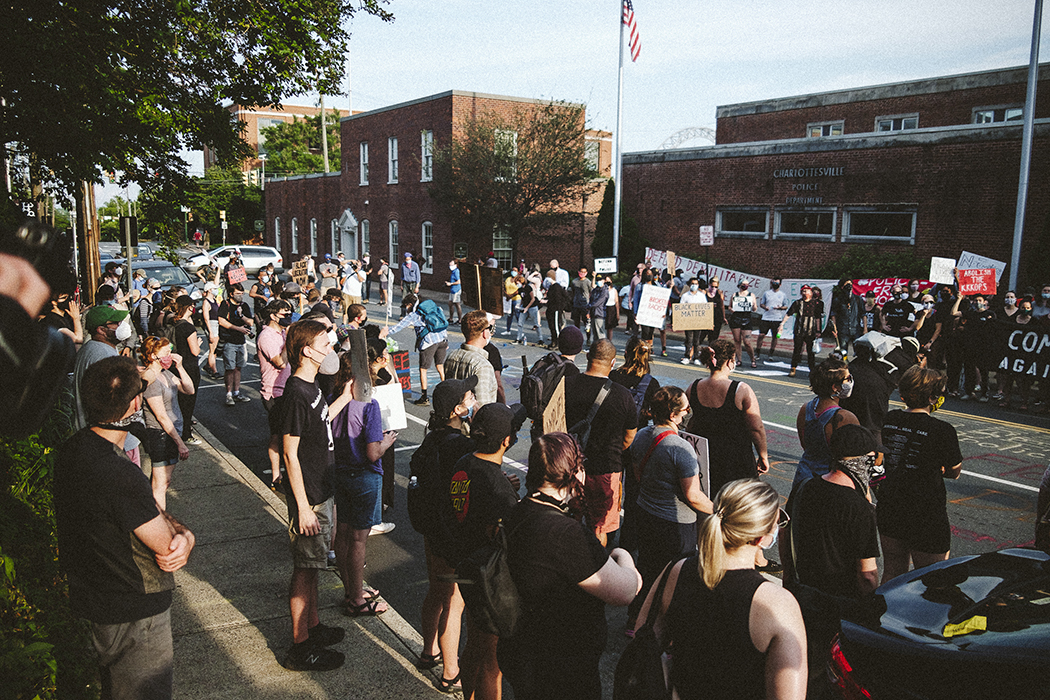Charlottesville’s Police Civilian Review Board continues to disagree with city officials over how much power it should wield.
Shortly after August 2017, in response to demands for increased oversight of law enforcement, City Council committed to the creation of a Police Civilian Review Board, a body that would give area residents some checks on the police’s power. In the years since, the board has been caught in bureaucratic limbo, as its members, elected officials, and law enforcement have quarreled over how much power the board should have. The drawn-out process has frustrated those hoping to see local criminal justice reform.
This summer could offer clarity, as a new law—passed by the state legislature in the wake of last summer’s racial justice demonstrations—explicitly grants broad power to police civilian review boards across Virginia. In an April 27 work session, Charlottesville CRB members proposed a new set of rules for the board, and city councilors expressed concerns.
Under the new law, the CRB is allowed to receive, investigate, and issue findings on complaints of serious misconduct and incidents involving use of force. It also has the power to subpoena documents and witnesses. If the accused party is found guilty of misconduct, the board can issue a binding disciplinary ruling for cases involving “serious breaches of departmental and professional standards” after consulting with the police chief, including demotion, suspension without pay, or termination.
The new law also gives the board power to review less serious internal affairs investigations, as well as evaluate department policies, practices, and procedures.
Since December, a group composed of current and former CRB members, as well as members of the activist group The People’s Coalition, has worked to align the current ordinance with the new state law, researching various police oversight models and consulting with the National Association for Civilian Oversight of Law Enforcement.
“I have real serious problems,” said Councilor Lloyd Snook of the proposed ordinance. “I have no problems with a good strong review board. But I don’t see this draft as creating a review board, [but] a substitute disciplinary board.”
Councilor Heather Hill and Police Chief RaShall Brackney claimed that the board had not collaborated enough with CPD on the ordinance. Brackney worried there would not be due process for officers under both the CRB and CPD’s disciplinary processes.
“We’ve been taking advice from the acting city attorney and our independent counsel. They both reviewed the draft ordinance and neither of them have raised the issues that Chief Brackney did,” responded CRB vice-chair Will Mendez.
Both Councilors Michael Payne and Sena Magill pointed out that the board’s investigations may not be exempt from the Freedom of Information Act, which could discourage community members from coming forward with complaints.
“Right now we cannot promise that members of the public that their personal information can be protected. That is definitely a detail that needs to be worked out,” said Acting City Attorney Lisa Robertson.
City Council has had plenty of time to have investigated and done the research to find out what models would work for Charlottesville.
Rosia Parker, initial CRB member
Several councilors expressed concern over the operating procedures for the board’s investigations, but CRB chair Bellamy Brown explained they could better address these specific concerns once an executive director is hired. The city is actively searching for a board director, and has received 64 applications for the position.
Mayor Nikuyah Walker questioned what a proper collaboration between the board and department would look like. “When we’re talking about transforming a system, there’s only so much that the individuals already a part of that system can bring to the table,” she said.
During public comment, initial CRB member Rosia Parker criticized the councilors for their unfamiliarity with the new legislation and focus on the rights of police officers. “City Council has had plenty of time to have investigated and done the research to find out what models would work for Charlottesville,” she said.
“I’m not sure why there is fear for breaking ground and why you should have any fear of creating oversight of the police,” said lawyer Teresa Hepler. “People of color being followed, harassed, and injured by the police are afraid. So how can you be scared to do something different?”
Walker responded that she is “not against anything,” but that she wants to know exactly how the revamped board is going to work before she votes on the ordinance. Payne and Magill agreed that the city must get the ordinance right the first time around, or other localities may be deterred from creating their own powerful review boards.
After further discussion, council and the board agreed to have multiple full-day work sessions to go over each specific power in the draft ordinance with the board’s legal council and Robertson.
Moving forward, initial CRB member Sarah Burke hopes that council will get “up to speed” on the new legislation, and will listen to the community as it works with the board to provide meaningful police oversight.
“What I saw the other night was the City Council grilling the CRB on the model without seeming to have a lot of their own background and research on the issue,” says Burke. “I [also] don’t understand this idea that somehow the CRB should be chastised for failing to listen to the police officers who haven’t engaged with the work.”
Parker also urges council to be open-minded, transparent, and willing to change.
“We as the people, we’re going to keep pushing,” she says. “It’s time for change, and the time is now.”
